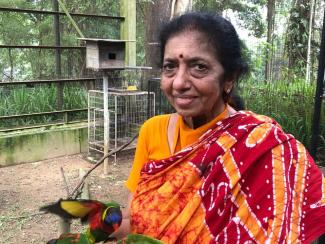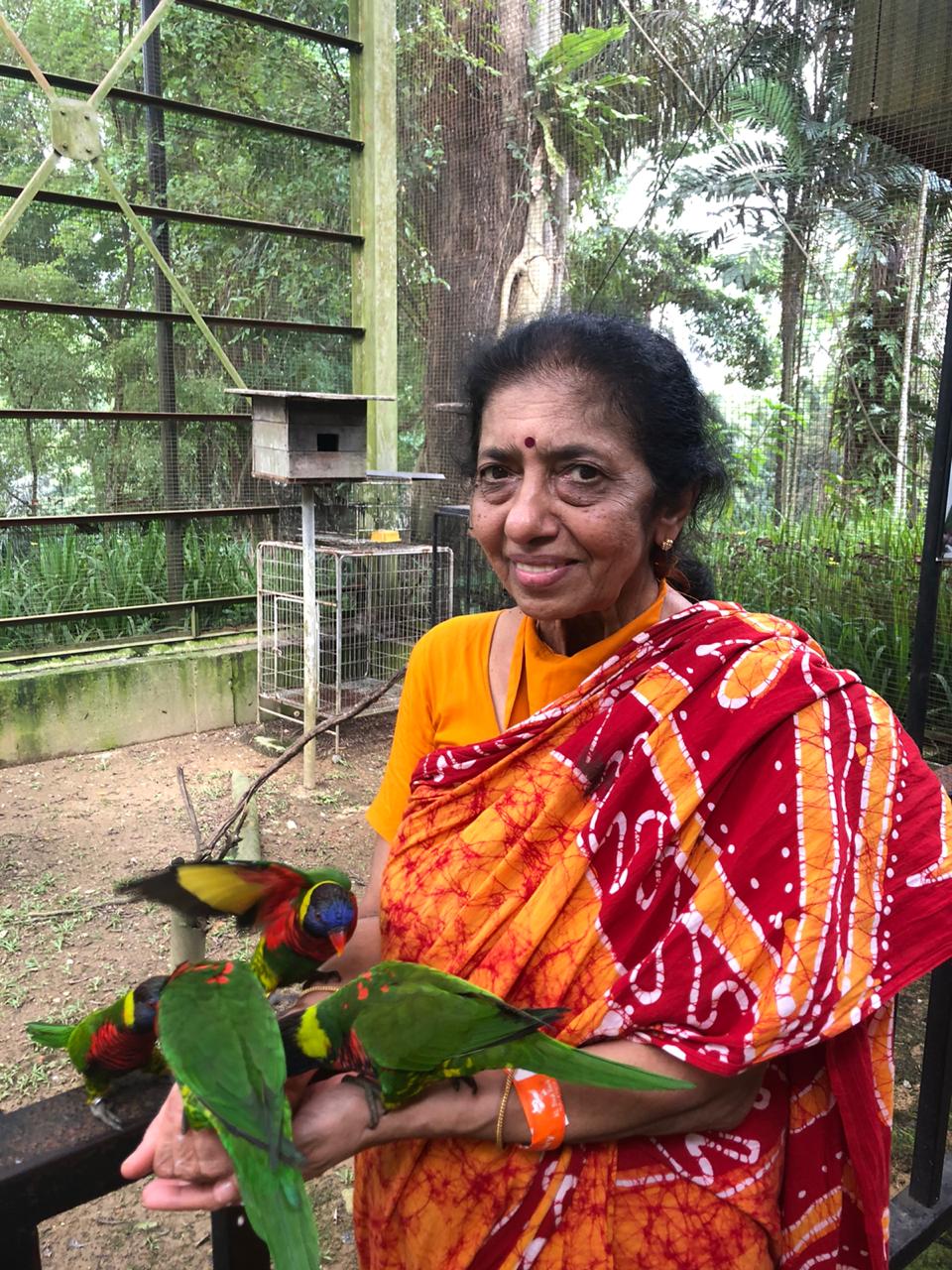
Nalini Satyanarayana, 72-year-old nonsmoker, was diagnosed with throat (voice box) cancer 10 years back because of exposure to second-hand smoke in her house. Today, as survivor, she has become an energetic tobacco control warrior and counsels patients after laryngeal surgery and teaches them to talk.
When and how did you reckon a problem with your throat?
It was January 2010. I felt my throat was hoarse. I could not speak clearly and was getting breathless. When medicines did not get me any relief in my throat, I was recommended a neck CT scan. The scan showed a tumour in one of the vocal chords. Later, biopsy revealed that the tumour was malignant.
हिंदी में पढ़ें: मैंने अपनी आवाज पैसिव स्मोकिंग (निष्क्रिय धूम्रपान) के कारण खो दी
You had a traumatic experience after you lost your voice box to throat cancer. Please describe your experience of managing the condition?
Physically I felt all the symptoms listed above and emotionally I felt underconfident, scared, anxious that I will not be able to speak again. I had to undergo total laryngectomy ie. removal of the vocal chords and thyroid to prevent relapse and spread. I was dejected when the doctor said that I would not be able to speak. I needed tube feeding for about 1 month post surgery.
I had 30 sessions of Radiation therapy right after surgery. Because of radiation therapy I lost many of my natural teeth which had become brittle, so I had to replace them with artifical teeth.
How did you recover?
It would have helped me to have a speech therapist to help me regain confidence with my speech. I decided to accept the situation and bounced back to a new normal life with my willpower and determination.
After your vocal chords were removed, how did you learn to speak again?
I learnt to talk with the prosthesis (artificial voice box) in my throat. I had to breathe and talk through this hole called stoma. I also learned to modulate and play the clarinet for a minute. It was a big challenge but I wished to show others that nothing is impossible for a cancer survivor. People who have just met me find it difficult to understand me due to my prosthetic voice.
What has been your biggest challenge in recovering from your treatment?
The biggest challenge in recovering was cough. I used to find it difficult to lie down. But I overcame this by keeping two pillows.
What was your chief source of support and motivation during your recovery?
My chief support was my family, doctors and friends. I have a son and a daughter, both of whom are very supportive. My husband passed away due to cardiac ailments before my cancer.
What lifestyle changes did you make after your throat cancer?
I had to change my lifestyle to suit the present situation. I now eat soft food like dosa, rice, etc. I try to avoid hard snacks. It has affected my eating habits as I need to consume liquids alongside my solid food. I tend avoid spicy and fried foods and also cold food as it affects my throat.
I cannot breathe through my nose as it is not connected to my lungs. Prosthesis in my throat is fitted between my food pipe and wind pipe. So when I eat, sometimes food particles stick to the prosthesis and block the hole. Then I have to clean the prosthesis with a brush, only then I can speak. When I go out, I always carry a brush and a mirror with me. But we should not feel that this is a disability but be grateful that I have a unique voice by which I am able to communicate. My voice has obviously changed due to voice box removal. But, alas I continue to be the cheerful chatterbox that I am
Related Reading: Soft Food Options for Lunch and Dinner, Soft Food Options for Snacks
You were exposed to secondhand smoke for many years which led to your cancer. What are the harmful effects of passive smoking?
My husband was a chain smoker, but I never realised the dire consequences at that time. In a family, if someone smokes the others should be careful, as you will be unknowingly inhaling the toxins of tobacco.
Passive smoking or secondhand smoking is more dangerous than direct smoking, as in that case the passive smoker inhales all the toxins exhaled by the smoker for no fault of theirs - as happened in my case.
You are a member of the Voice of Tobacco Victims, and the Pink Hope Support Group in HCG Global. What has been your most gratifying moment?
I am a volunteer in the BBMP, a government body for smoke free Bangalore and passive smoking. I am a member of Institute of Public Health, Voice of Tobacco Victim, and the Pink Hope Support Group. Pink Hope Support Group has 20 cancer survivors as members. We have a meeting every month where we invite a specialist to speak. We also counsel patients. Now we have online meetings. The most gratifying moment is when I counsel a patient after surgery and teach them to talk, and am rewarded with a smile. I wish to bring a smile on as many faces as possible.

What is your advice to healthcare providers, patients and their families to better manage this cancer and improve quality of life?
I would suggest the healthcare providers provide more psychological and moral support. I would also advice them to mentally and emotionally prepare the family to receive the patient with utmost care and love. I would also ask them to provide ample facilities for the patient to consult with speech therapists.
I would encourage patients to join groups where they can find like survivors such as themselves and feel more normal. I would also encourage them to talk.
I would also advice patients to carry tissues, necessary tools, hot water etc for their wellbeing and to not be embarrassed by it.
Despite facing such a major setback in life, you are a beacon of hope and inspiration for hundreds. What keeps you going?
I lost my voice to cancer but that didn’t slow me down. My life after cancer has been busier than before. I learnt to play the flute as a challenge. I continue to cook and follow my passion for gardening. I decided that my life should be useful to society, so I decided to help other patients and also do many awareness programmes for kids to tell them that the first puff is addicted. I feel every human being has a duty towards betterment of their fellow beings.
My motto is ‘forget the bitter past , live in the present and hope for the future’.
I dream of a tobacco free country.






